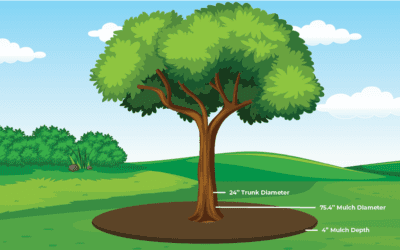There are several factors that contribute to frost heave, including chemical composition of the soil, the amount of moisture in the soil, and even the type of soil itself. Sandy soils are more prone to frost heave than clay soils, for example. This is because a sandy soil has more capillary space for water to enter and subsequently freeze. More dense soil types don’t hold as much water in the spaces between soil particles and therefore don’t freeze as easily.
Frost heaves tend to happen most frequently in dips or slopes in your soil that allow for water to pool and slowly seep into the ground. Proper grading to encourage healthy drainage from your tree’s root system is the best way to prevent frost heave, but such conditions are not always possible. In those circumstances there are some things you can do to prevent frost heave from damaging your trees or property.
Here are some ways that you can help prevent frost heave from occurring in susceptible areas.
- Using mulch: Mulch insulates the ground and helps to prevent it from freezing and thawing.
- Using leaves and evergreen boughs to insulate your tree’s root system. Leaves and boughs are especially effective at trapping air and providing insulation to delicate root systems.
- Applying salt: Salt can help to lower the freezing point of water, which can help to prevent frost heave. It is important to note that the amount of salt added should be carefully considered. Adding too much salt around your trees can cause tree death or damage of its own.
- Building a fence or barricade: A fence or barricade can block the wind, which, in turn, helps to prevent frost heave.
If you are concerned about frost heave on your property, contact the professionals at Hentges Tree Service.
DO YOU NEED HELP?
We’re here to serve you and we provide free estimates.



